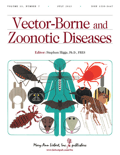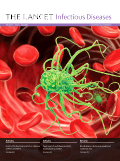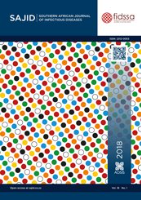
IJID Regions
Scope & Guideline
Bridging research and policy for enhanced health outcomes.
Introduction
Aims and Scopes
- Epidemiological Studies:
The journal publishes extensive epidemiological research that analyzes the distribution and determinants of infectious diseases in specific geographical areas, providing insights into disease burden and trends. - Public Health Interventions:
Research that evaluates the effectiveness of public health interventions, such as vaccination programs, sanitation improvements, and health education campaigns, is a significant focus, aiming to enhance community health outcomes. - Infectious Disease Surveillance:
Studies related to surveillance methodologies for tracking infectious diseases and outbreaks, including innovative approaches like wastewater-based epidemiology, are prominent, showcasing advancements in public health monitoring. - Antimicrobial Resistance:
The journal addresses the growing concern of antimicrobial resistance through studies that explore resistance patterns, risk factors, and management strategies, contributing to global health security. - Clinical Characteristics and Outcomes:
Research detailing the clinical presentation and treatment outcomes of infectious diseases in diverse populations, enhancing understanding of disease impacts and management strategies. - Zoonotic and Vector-borne Diseases:
The journal includes studies on zoonotic diseases and vector-borne illnesses, focusing on their epidemiology, transmission dynamics, and control measures, given their significant public health implications. - Global Health Perspectives:
The journal emphasizes a global health perspective, including studies that consider socio-economic, cultural, and environmental factors influencing infectious disease spread and control.
Trending and Emerging
- Impact of COVID-19:
Research examining the ongoing impact of COVID-19 on health systems, disease dynamics, and public health strategies is trending, with a focus on long COVID and its implications. - Wastewater-based Epidemiology:
Innovative studies utilizing wastewater-based epidemiology for monitoring infectious diseases have gained traction, highlighting novel surveillance methods and their effectiveness in outbreak detection. - Mental Health in Infectious Disease Contexts:
Emerging research on the interplay between infectious diseases and mental health outcomes is gaining attention, reflecting a holistic approach to health that considers psychological well-being. - Global Vaccination Strategies:
With the global push for vaccination against various infectious diseases, studies evaluating vaccination strategies, coverage, and outcomes are increasingly prevalent, particularly in low-resource settings. - One Health Approach:
Research adopting a One Health perspective, integrating human, animal, and environmental health in understanding and managing infectious diseases, is on the rise, reflecting a comprehensive approach to public health. - Antimicrobial Stewardship Programs:
There is a growing emphasis on studies related to antimicrobial stewardship and resistance management, as healthcare systems globally seek to combat the rising threat of drug-resistant infections.
Declining or Waning
- Vaccine Hesitancy Studies:
Research focused on vaccine hesitancy and public perceptions of vaccination has seen a decline, potentially due to the increasing acceptance of vaccines, particularly in the context of COVID-19. - Non-communicable Disease Interactions:
Studies examining the intersections between infectious diseases and non-communicable diseases (NCDs) have diminished, possibly as infectious disease research regains focus following the pandemic. - Historical Epidemiological Analyses:
There has been a noticeable decrease in historical analyses of infectious diseases, as the journal shifts towards contemporary studies that address current outbreaks and emerging infectious threats. - Localized Infectious Disease Outbreaks:
Research focusing on localized outbreaks without broader implications for public health policy appears to be waning, as the journal favors studies with wider relevance and applicability. - Laboratory-based Diagnostic Innovations:
While still relevant, the frequency of studies solely dedicated to laboratory diagnostic innovations has decreased, as the journal emphasizes integrated approaches that also consider field applicability and public health impact.
Similar Journals

VECTOR-BORNE AND ZOONOTIC DISEASES
Advancing knowledge on the frontlines of infectious diseases.VECTOR-BORNE AND ZOONOTIC DISEASES is a prominent journal dedicated to advancing research in the fields of infectious diseases, microbiology, and virology, published by Mary Ann Liebert, Inc. With a rich history spanning from 2001 to 2024, this journal plays a critical role in disseminating cutting-edge research and insights regarding diseases transmitted by vectors and zoonotic pathogens. It has achieved notable rankings, including Q2 in the Infectious Diseases category and Q3 in both Microbiology and Virology as of 2023. The journal's emphasis on quality and relevance is further underscored by its established position—ranked 151st in Infectious Diseases and within the 43rd percentile in Virology according to Scopus. Although not an open-access journal, the publication ensures that its findings reach a broad audience of researchers, professionals, and students dedicated to tackling the challenges posed by these critical health issues. By providing a platform for innovative studies and discussions, VECTOR-BORNE AND ZOONOTIC DISEASES remains an essential resource for those at the forefront of disease research and public health strategies.

New Microbes and New Infections
Exploring the unseen world of microbes and their impact on health.New Microbes and New Infections is an esteemed peer-reviewed journal published by Elsevier Sci Ltd that has been a prominent platform for disseminating groundbreaking research in the fields of Infectious Diseases and Microbiology since its establishment in 2013. With an impressive Open Access model, this journal ensures that vital research findings are readily accessible to researchers, healthcare professionals, and academics worldwide. Positioned in the Q2 category for Infectious Diseases and Q3 for Microbiology in 2023, it reaches a significant global audience, as demonstrated by its high Scopus rankings—#44 out of 344 in Medicine: Infectious Diseases, and #34 out of 182 in Immunology and Microbiology. The journal aims to inspire new ideas and foster collaborations by publishing high-quality research focused on novel microbes and infections, thus playing a crucial role in advancing science and public health in an era where understanding infectious agents is more vital than ever.

LANCET INFECTIOUS DISEASES
Empowering Healthcare Through Rigorous ResearchLANCET INFECTIOUS DISEASES is a premier journal published by Elsevier Science Ltd, dedicated to disseminating high-quality research and comprehensive reviews in the field of infectious diseases. Since its inception in 2001, the journal has become a pivotal resource in the medical community, recognized for its rigorous peer-review process and impactful contributions to public health. With an impressive Scopus rank of #2 out of 344 in the category of Medicine - Infectious Diseases, it consistently ranks in the 99th percentile, highlighting its importance and influence in shaping clinical and epidemiological research. The journal's commitment to advancing knowledge in infectious diseases is underscored by its Q1 quartile designation in 2023, affirming its status as a leading academic outlet. Although not an open-access journal, LANCET INFECTIOUS DISEASES provides essential insights for researchers, healthcare professionals, and students, bridging the gap between cutting-edge research and practical application in an increasingly interconnected world.

Southern African Journal of Infectious Diseases
Exploring innovative solutions for public health challenges.Southern African Journal of Infectious Diseases is a pivotal platform for the dissemination and advancement of research in the field of infectious diseases, with a particular focus on issues significant to the Southern African region. Published by AOSIS, this Open Access journal has been committed to providing accessible scholarly content since 2016, enabling researchers and practitioners to stay updated with the latest developments in infectious disease epidemiology, prevention, and management. With the ISSN 2312-0053 and E-ISSN 2313-1810, the journal invites submissions that explore diverse topics, including but not limited to clinical studies, public health policies, and innovative treatment methodologies. The Southern African Journal of Infectious Diseases is an essential resource for academics, professionals, and students dedicated to combating infectious diseases and improving health outcomes in the region, fostering a collaborative approach to research and knowledge sharing.

Journal of Infection and Public Health
Advancing the Frontiers of Infection and Public HealthJournal of Infection and Public Health is a premier open-access journal published by ELSEVIER SCIENCE LONDON, dedicated to advancing knowledge in the fields of infectious diseases, public health, and environmental health. Since its inception in 2008, this esteemed journal has become a cornerstone of research dissemination, especially after transitioning to an open-access model in 2017, allowing wider accessibility to groundbreaking studies. With an impressive impact factor and ranking in the Q1 category for Infectious Diseases and Public Health as of 2023, the journal stands at the forefront of scientific inquiry, boasting a Scopus rank of #22 out of 665 in Public Health, underscoring its influence and reach in the academic community. Researchers, professionals, and students alike will find the journal's rich repository of peer-reviewed articles invaluable for ongoing education and practice in a rapidly evolving field. For contributing to the global understanding of health dynamics, Journal of Infection and Public Health is a vital resource, inviting scholars to explore, engage, and contribute to the crucial discussions shaping our world.

Journal of Global Infectious Diseases
Connecting researchers to combat infectious diseases.Journal of Global Infectious Diseases, published by Wolters Kluwer Medknow Publications, serves as a pivotal resource in the field of infectious diseases, offering insightful research and critical analyses that contribute to global health discourse. Since its inception as an Open Access journal in 2009, it has aimed to disseminate knowledge on various facets of infectious diseases, fostering collaboration among researchers, clinicians, and public health professionals. With an impact factor indicative of its growing significance—ranked in the Q3 category of Infectious Diseases for 2023—this journal publishes a diverse range of studies, from basic science to clinical applications. Its dedicated contributions help address pressing health challenges and enhance knowledge sharing in an era where infectious diseases pose significant threats worldwide. Based in India, the journal not only highlights regional health issues but also connects to the broader global landscape, making it an essential platform for anyone interested in advancing the field.

Journal of Infection in Developing Countries
Empowering communities with vital infectious disease insights.Journal of Infection in Developing Countries, published by J INFECTION DEVELOPING COUNTRIES, is a premier open-access journal dedicated to advancing research in the fields of infectious diseases, microbiology, parasitology, and virology, particularly within the context of developing nations. Established in 2007 and actively disseminating knowledge since 2008, this journal aims to bridge the gap between researchers and practitioners by providing a platform for high-quality, peer-reviewed articles that address the unique challenges faced in these regions. With an ISSN of 1972-2680 and a robust HIndex showcasing its growing influence, JIDC has attained a Q3 category ranking in several disciplines as of 2023, indicating its crucial role in shaping ongoing discourse in public health. As an open-access publication, it ensures that vital research is accessible to all, fostering collaboration and innovation in infectious disease management and control.

JMIR Public Health and Surveillance
Empowering global health initiatives with cutting-edge surveillance insights.JMIR Public Health and Surveillance is a premier open access journal that has been at the forefront of public health research since its inception in 2015. Published by JMIR PUBLICATIONS, INC in Canada, this journal holds an impressive Q1 ranking in both Health Informatics and Public Health, Environmental and Occupational Health as of 2023. With a commendable Scopus Rank of #18 out of 665 in Public Health and #10 out of 138 in Health Informatics, JMIR Public Health and Surveillance stands out for its rigorous peer-reviewed articles that contribute significantly to the advancement of knowledge in these vital fields. The journal is committed to promoting research that advances the understanding and surveillance of health trends, disease outbreaks, and population health metrics, thus serving as an invaluable resource for researchers, professionals, and students alike. By facilitating open access to high-quality content, it ensures that results of critical public health research are readily available, ultimately helping to inform policy and public health initiatives across the globe.

Archives of Clinical Infectious Diseases
Empowering Professionals with Cutting-Edge ResearchArchives of Clinical Infectious Diseases is a peer-reviewed journal dedicated to advancing knowledge in the field of infectious diseases, published by BRIEFLAND in Iran. With a broad scope, it covers various aspects of cardiology, critical care, immunology, microbiology, public health, and toxicology, affirming its relevance in today's health landscape. Despite the lack of open access options, the journal maintains a strong reputation, reflected in its Q3 ranking in multiple categories within the 2023 category quartiles. The journal aims to provide a platform for researchers and practitioners to disseminate critical findings that can impact clinical practices and public health policies. Its commitment to rigorous peer review ensures that only high-quality research is published, thereby serving as an essential resource for professionals, students, and public health advocates. For those engaged in the ever-evolving world of infectious diseases, Archives of Clinical Infectious Diseases stands as a vital contribution to the medical literature.

Current Tropical Medicine Reports
Shaping the future of immunology and allergy research.Current Tropical Medicine Reports, published by Springer, is an esteemed journal that serves as a pivotal platform for researchers, professionals, and students in the fields of immunology, allergy, and infectious diseases. With a strong focus on emerging tropical medicine topics, the journal provides an authoritative avenue for disseminating innovative research and practical insights, showcasing its commitment to advancing global health knowledge. Now in its convergence years from 2014 to 2024, it has successfully established itself in the academic community, evidenced by its Q2 rankings in the categories of Infectious Diseases and Immunology and Allergy in 2023, reflecting its impact and relevance. The journal boasts impressive Scopus rankings, holding the 50th position in Infectious Diseases and 55th in Immunology and Allergy, further underscoring its significance in these critical fields. While it operates under a subscription model, the journal serves not only as a resource for published research but also as a catalyst for collaboration and knowledge exchange among the scientific community. With a growing readership, Current Tropical Medicine Reports is poised to continue shaping the discourse surrounding tropical health challenges.